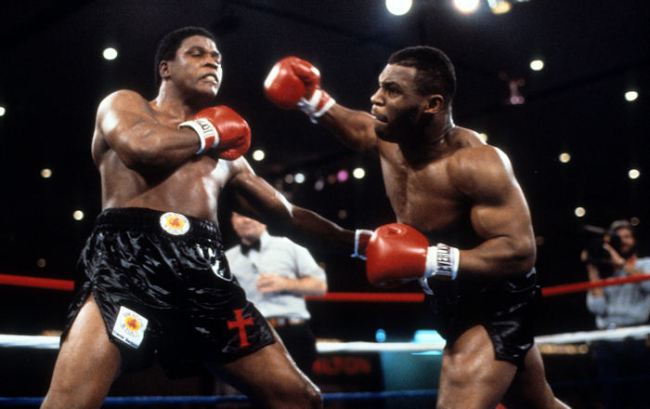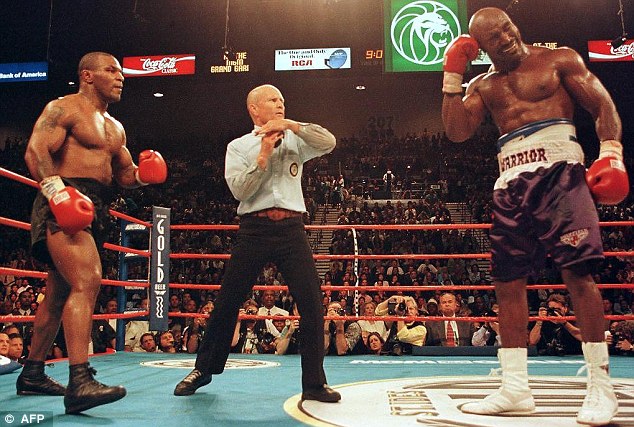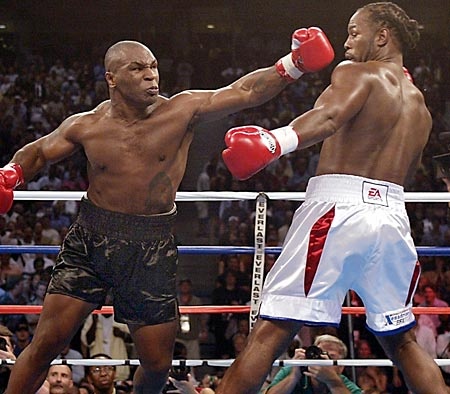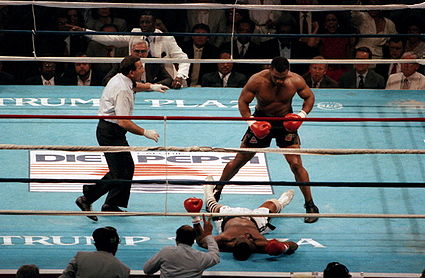Mike Tyson: Worthy of the International Boxing Hall of Fame?
It did come as a bit of a surprise when I found out that Mike Tyson was inducted into the World Wrestling Entertainment Hall of Fame. I knew he had some involvement with the WWE, but surely not enough to warrant a place in their Hall of Fame. What came as an even bigger surprise though, was that some people objected to Tyson’s inclusion in the International Boxing Hall of Fame a few years ago. By BoxBets.

Photo courtesy of Thrash Sports
One of the most well known figures to voice his disapproval was Teddy Atlas, a former Tyson trainer during his amateur days. His main argument, in-keeping with the other Tyson critics, seems to be that Mike Tyson could only beat lesser opponents and would invariably lose when paired with anyone of significant talent. If you take things only at face value, then that may seem true, but there is certainly a lot more to the story than that.
When we consider the opponents that Tyson did beat, the so called ‘second line fighters’ as one critic called them, we must also consider the era Tyson was fighting in. This was definitely below the’ Heavyweight Golden Age’ of the 1970’s, no doubt, but we can hardly blame Tyson for that. However, it has to be said that the 1980’s had a greater talent pool than we are currently experiencing. Some have even suggested that the current heavyweight division is possibly the worst in boxing history, with challengers being nothing more than Klitschko fodder.
Low level of opposition is a criticism often levied against Rocky Marciano – as well as the fact that the biggest names on his CV were all past their best when they faced The Brockton Blockbuster, and yet he is a welcome addition to the IBHOF, so why not Tyson? Like Marciano, Tyson could only beat the man in front of him, and that is exactly what he did in spectacular, explosive style. Had he struggled against these guys, then the critics may have a point, but Mike Tyson knocked out 88 per cent of his victims on his way to clearing out the division, and in doing so beat nine opponents who would hold a world title at some stage in their career. Not bad statistics.

Courtesy of uproxx
Mike Tyson vs James ‘Buster’ Douglas
Atlas and the other critics put forward the notion that if Mike Tyson couldn’t intimidate an opponent, if they would stand up to him, then he would lose. Well, let’s start with Tyson’s first career defeat to James ‘Buster’ Douglas. Can anyone really say that Douglas was a superior boxer to Tyson? Let’s hope no one is that foolish.
Going in to the fight James Douglas was a 42-1 underdog, and that is where part of the problem lies. Tyson severely lacked motivation for that fight; he didn’t train properly and thought he just had to turn up to win. Reports of him partying in Tokyo days before the fight and being knocked down by Greg Page in sparring are well known.
Despite that, Tyson did fight gamely and with heart. In fact, the unfit Tyson even dug deep enough to pull out a knock out punch- sending Douglas to the canvass for 14 seconds in the eighth round. Were it not for the ineptitude of referee Octavio Meyran, Tyson would have been declared the winner. It is another case of boxing history being affected by a ‘long count’.

Courtesy of the Daily Express
Mike Tyson vs Evander Holyfield
With the first Evander Holyfield fight, it was a similar case to the Douglas fight. Tyson had taken his eye off the ball. He had returned to his old ways of drinking, partying, and whatever else- training was no longer given his full attention. Again he was complacent, and again he was punished for it. The fact that the referee allowed Holyfield to head butt throughout the contest didn’t help matters either. (That issue would also be the case in the rematch and would be the cause of the infamous ear biting incident).

Courtesy of the Daily Mail
Even by this point in his career, Mike Tyson was past his prime. To be honest, he was even past his prime before the Douglas fight. Most people believe that Tyson was at his peak in 1988- a mere 3 years after turning professional. A split with trainer Kevin Rooney in that same year saw a down turn in Tyson’s performances, even if it wasn’t altogether evident at the time. The things that made him special- the head movement, the defensive skills, the combination punching, were being forgotten. After the defeat to Douglas, and with new trainer Richie Giachetti at the helm, his skills deteriorated even further. Tyson was turning into a slugger rather than an analytical boxer.
There is one point where I do agree with the Tyson knockers, and that is he threw away his talent. The aforementioned decline was, for the most part, down to Tyson not applying himself as had done under the guidance of legendary trainer Cus D’Amato and Rooney. It is interesting to hear Rooney talk about Tyson being only fifty per cent of the fighter he could have been, and that even in his prime years, his best moments were being left in the gym as he found it difficult to relax in the ring. What might have been?
Mike Tyson vs Lennox Lewis
If Mike Tyson was at his peak in 1988, then he was most definitely a shadow of his former self when he faced Lennox Lewis in 2002. That contest can hardly be seen as a true comparison of their respective skills. In the 2008 documentary Tyson by James Toback, Tyson himself admits that he knew beforehand he couldn’t win that fight. He agreed to the bout merely to ease his financial burdens.

Courtesy of the Fight City
Little needs to be said of the defeats to Williams and McBride, Tyson had long since wanted out of boxing, and as with the Lewis bout, he was forced to fight on in an attempt to pay off his huge debts. In fact, he was so far past his best that he was ‘Tyson’ only in name. Those defeats must be looked on in the same way as Muhammad Ali’s defeats to Larry Holmes and Trevor Berbick.
Mike Tyson vs Micheal Spinks
It is a shame that Tyson faced arguably his two greatest rivals when he was in decline, as a prime Tyson’s power, speed, and movement would have caused major problems for Holyfield and Lewis. But let us not forget the Michael Spinks fight, when Spinks was unbeaten and seen as the lineal champion, and favoured by more than a few in the boxing media. Tyson blew him away in ninety-one seconds in what was perhaps the pinnacle of his career.

Courtesy of BoxRec
When judging a boxer, I always look at his prime years to gauge how good he really was. Mike Tyson, at his peak, was a phenomenon. This is the man that holds the record for being the youngest ever heavyweight champion in boxing history- aged just 20 years old; the man that won the title just over a year after turning professional; the man that beat numerous champions and ex-champions, unified the heavyweight division, and would nearly do so for a second time after being released from prison; the man that knocked out 44 of the opponents he faced.
As former boxer John Scully says, ‘Many fans got so lost in the explosiveness they didn’t notice the subtle things that set up his knock outs. Many of his best victories were often more calculated and perfectly executed, systematic destructions than lucky bombs away knockouts.’ Indeed, people often think of Mike Tyson as just a power puncher, but it was his electric hand speed, head movement, and counter punching, along with his studious and analytical approach to boxing, that truly made him great.
Compared to other members of the IBHOF, Tyson was certainly technically superior to Sonny Liston, Rocky Marciano, and George Foreman, and was a more concussive puncher than Muhammad Ali, and arguably just as fast.
Having said all that though, perhaps Tyson doesn’t belong in the Hall of Fame – the Wrestling Hall of Fame, but I can assure you he most certainly does belong in the International Boxing Hall of Fame.









